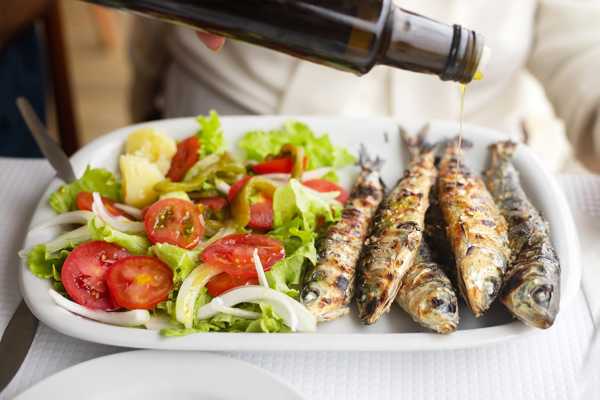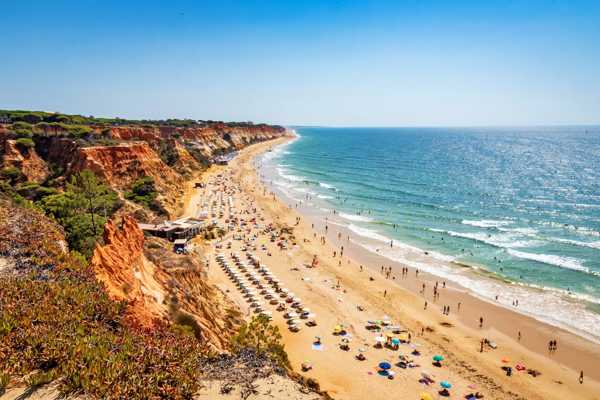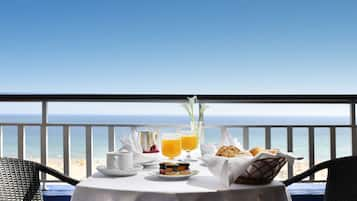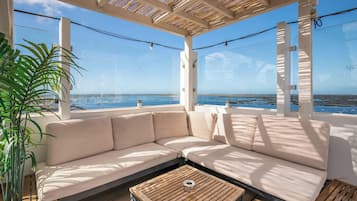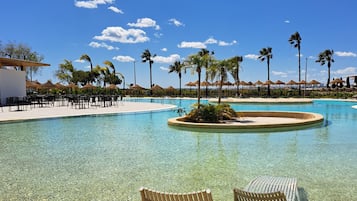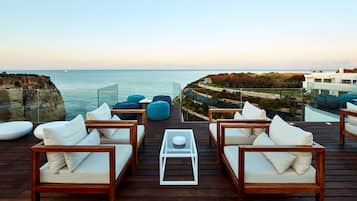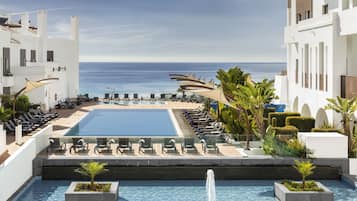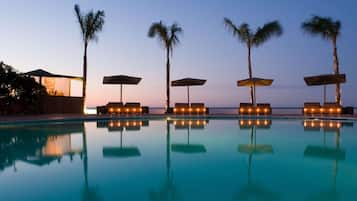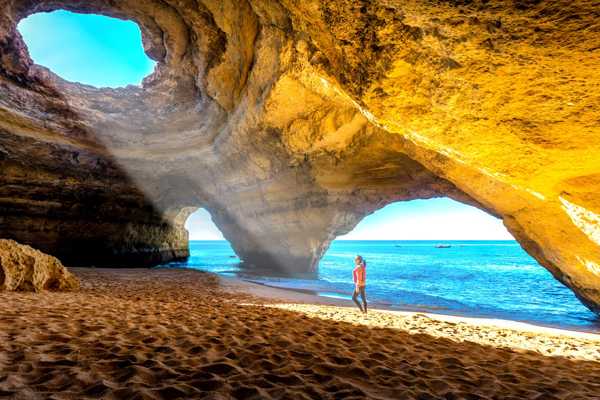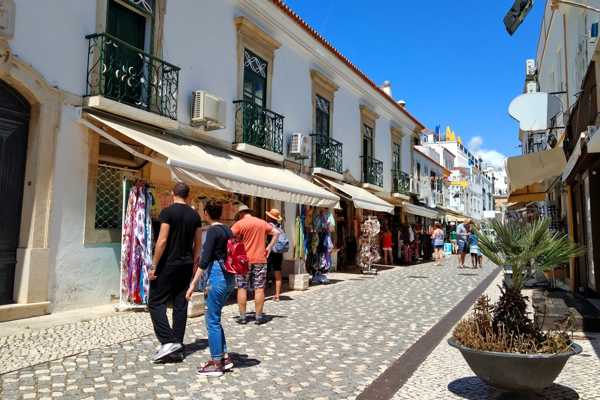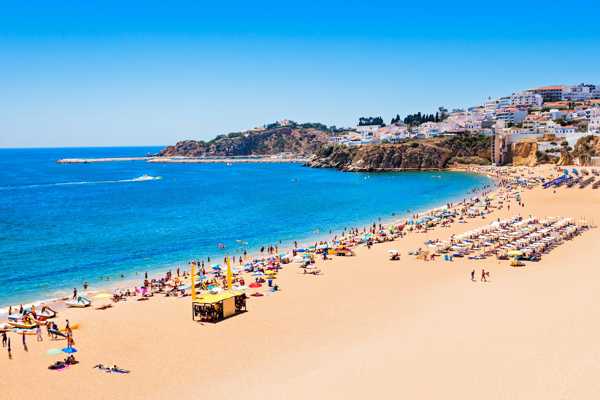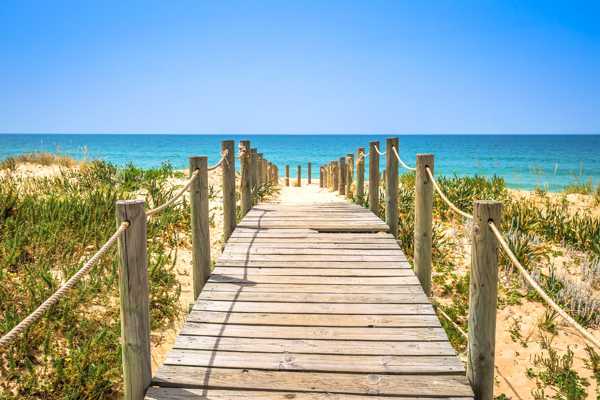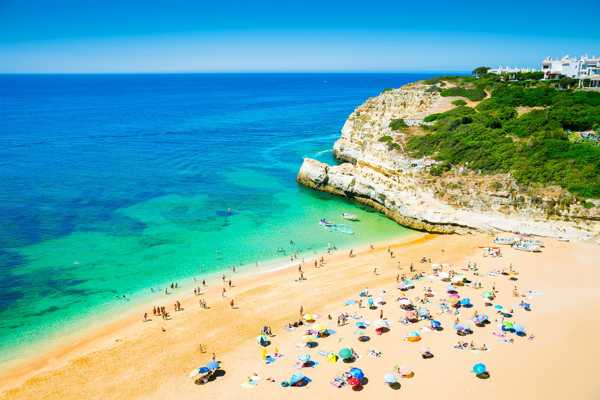The best things to do in the Algarve are spread across Portugal’s southernmost region. Fronting the western Atlantic coast, it’s dotted with some of the most beautiful beaches in the world. You’ll also be treated to a host of natural wonders, including hidden bays, coastal cliffs, and protected wetlands.
Whitewashed villages are part of the Algarve’s charm – these idyllic retreats let you step back in time, thanks to historical landmarks dating back centuries. Faro, Portimão and Lagos are among the region’s most visited towns, all of which offer excellent accommodation, dining, and nightlife opportunities.
What are the best things to do in the Algarve?
- 1
Beaches in the Algarve
Expect a diverse range of sandy spots across the region

- Aventure
- Économique
- Familles
- Photographie
Beaches in the Algarve range from secluded coves to dashes of dune-backed sand, so there’s plenty of variety across this region of Portugal. Most of these stretches front the western Atlantic coast, resulting in some of the best sunset views in the world.
Praia da Marinha is a gorgeous beach on the coast of Caramujeira, sporting dramatic cliffs and pit caves. Surfers in Sagres can hang ten at world-class spots like Praia do Beliche and Praia do Tonel. If you just want to soak up the sun, Praia dos Pescadores and Praia da Falesia in Albufeira are your best bets.
- 2
Algarve towns and resorts
Old-world charm meets contemporary conveniences

- Couples
- Familles
- Histoire
- Photographie
Most Algarve towns and resorts are found along the western Atlantic coast, giving you easy access to pristine beaches and reef-rich water. However, you can find many sleepy villages exuding romantic or rustic charm.
Staying in Faro – the Algarve’s capital – puts you within walking distance of beautiful cathedrals, Roman villas, and quiet beaches. If you prefer a more lively atmosphere, consider Portimão for its gorgeous beaches, vibrant nightlife, and annual festivities. Families often visit Albufeira, thanks to its well-monitored beaches, waterparks, and kid-friendly excursions.
- 3
Ria Formosa Natural Park
A collection of gorgeous islands off Faro’s coast

- Aventure
- Couples
- Familles
- Photographie
The Ria Formosa Natural Park is a collection of barrier islands, sandbars and lagoons just off the coast of Faro. The best way to explore this 180-sq-km area is by boat – São Lourenço is home to exotic birds such as flamingos and white egrets. It’s also the only place in Portugal where you can see the purple gallinule, one of Europe's rarest birds.
Amona Island is excellent for snorkelling as seahorses often frequent the shallow seabed. The Ludo Hiking Trail appeals to walkers and cyclists with its 7-km-long graded route, which offers amazing opportunities to spot spoonbills, grey herons, coots, and moorhens.
Emplacement : Parque Natural da Ria Formosa, 8700-225 Olhão, Portugal
Téléphone : +351 918 720 002
Carte - 4
Ponta da Piedade
A dramatic headland with sea stacks

- Économique
- Couples
- Photographie
Ponta da Piedade is one of the most iconic landmarks in the Algarve. This dramatic headland offers expansive views of the Atlantic Ocean, framed by limestone sea stacks. The coastal rock formations are the result of wind and water carving their way through the cliffs over several centuries.
Today, it features a network of caves, grottoes, and tunnels along Portugal’s southern coast. There’s a steep staircase that takes you to the foot of the bay below. Ponta da Piedade is just 4 km south of Lagos. The best time to visit is at dusk when you can enjoy one of the best sunset views in the Algarve.
Carte - 5
Benagil Caves
A one-of-a-kind grotto in Lagoa

- Économique
- Photographie
The Benagil Caves (Algar de Benagil) is a dramatic sea cave with a distinctive hole in the ceiling. Its unique formation was shaped by the strong Atlantic waves, with 1 side in the ocean and the other on the beach. You’ll find several walking tracks around the cave, some of which lead to Praia da Corredoura and Praia da Marinha.
The Benagil Caves is located between Portimao and Albufeira in the Algarve. It’s only accessible by water, so you can join a boat tour or rent a kayak (if you’re feeling adventurous).
Carte - 6
Old Lagos
A quaint town surrounded by 16th-century city walls

- Économique
- Histoire
- Photographie
Old Lagos features whitewashed buildings and historical landmarks, all contained within the partial remains of 16th-century city walls. With cobblestone laneways and street corners decorated with azulejos (14th-century ceramic tilework), this picturesque town is best explored on foot.
A must-see is Saint Gonçalo's Gate, a well-preserved part of the city walls that also contains a shrine of the saint. Igreja de Santo António is a national monument dating back to 1707, while Forte da Ponta da Bandeira once guarded Lagos's waterfront.
Carte - 7
Castle of Silves
Ancient sandstone castle with Moorish architecture

- Histoire
- Photographie
The Castle of Silves (Castillo de Silves) is a well-preserved Moorish castle in the Algarve. It has been around since the period of Moorish rule, which spanned between the 8th and 13th centuries. The Romans took control of the castle in the 14th century, resulting in the construction of vaulted halls and Gothic doorways.
The red sandstone structure towers above the town of Silves, around 32 km northwest of Albufeira. Explore the castle’s old living quarters and cisterns, all built during the early Middle Ages. You can climb the battlements for sweeping panoramas of the town.
Emplacement : R. do Castelo, 8300-135 Silves, Portugal
Ouverture : April–May and September–October: daily from 9 am to 8 pm. June–August: daily from 9 am to 10 pm. November–March: daily from 9 am to 5.30 pm
Téléphone : +351 282 440 837
Carte - 8
Cape St Vincent
Scenic vantage point west of Sagres

- Économique
- Photographie
Cape St Vincent (Cabo de San Vicente) is a rocky headland at the south-westernmost tip of mainland Europe. The cape is around 7 km west of Sagres. You can stand on the rocks for dramatic views of steep cliffs and the Atlantic Ocean.
Cabo de São Vicente has a pretty lighthouse (with an adjacent maritime museum) that dates back to 1520. Walking along the cape can be a thrilling experience due to strong winds and crashing waves but make sure to keep a safe distance from the edge.
Carte - 9
Santo Antonio Church
Baroque cathedral in Lagos Old Town

- Économique
- Histoire
- Photographie
Santo Antonio Church (Igreja de Santo António) is an 18th-century Baroque landmark in Lagos Old Town. Despite its simple whitewashed facade, the cathedral boasts a very lavish interior of gold-plated woodwork, ceiling frescoes and intricate azulejos (traditional blue-and-white ceramic tilework).
Igreja de Santo António also contains paintings depicting the life of St Anthony, with explanations available in both Portuguese and English. Note that photography is forbidden inside the church – you can take photos of the exterior and 2 bell towers, though.
Emplacement : R. Gen. Alberto da Silveira 1, 8600-594 Lagos, Portugal
Ouverture : Tuesday–Sunday from 10 am to 12.30 pm and from 2 pm to 5.30 pm (closed on Mondays)
Carte - 10
Barreta Island
A secluded islet within the Ria Formosa Natural Park

- Économique
- Photographie
Barreta Island (Ilha Deserta) is an isolated islet off the coast of Faro. It’s one of the least-developed islands within the Ria Formosa Natural Park, attracting migratory birds like spoonbills and purple swamphen between September and November. Meanwhile, flamingos and terns frequent the island year-round.
There are no facilities along the 7-km-long sandbank, apart from a designated walking trail called the Santa Maria boardwalk. You can join a boat tour, which also stops at several islands within the 180-sq-km nature reserve.
Carte

